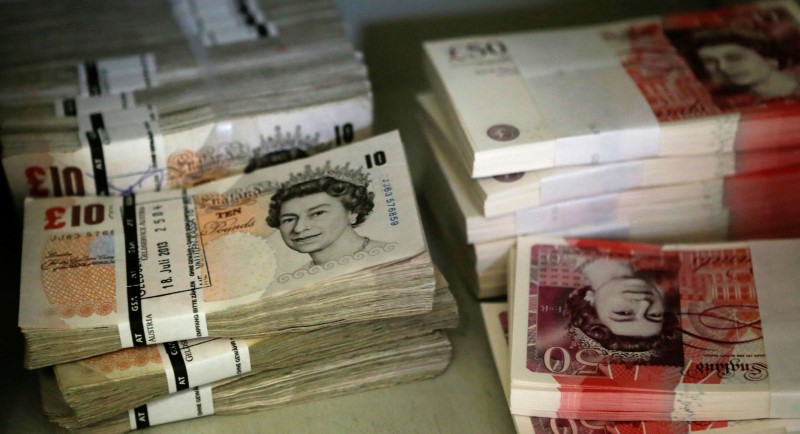By Anirban Nag
LONDON (Reuters) - Britain's vote to leave the European Union is raising questions about sterling's place among the small, elite group of hard currencies underpinning the financial system.
The pound's 14 percent slide since the vote to 31-year lows against the dollar is the biggest hit taken by one of these currencies in the post-1973 floating exchange rate system.
For Britons, the impact may feel slight or even ambiguous. Consumers of imported goods may see them become more expensive and travellers will find foreign trips more costly. Exporters, on the other hand, may find their products more competitive abroad and any overseas earnings get a boost.
But a bigger international impact could come if sterling's status as one of the currencies held in reserve savings by central banks and sovereign wealth funds is cast in doubt, risking a weaker and more volatile pound longer-term.
Reserve currencies are typically seen as dependable and easily convertible long-term stores of value, needed to meet emergency imports, service international debt, or to smooth the effects of volatile trade and investment shifts on local currency rates.
These hard cash reserves are then often banked back in the assets, mostly government debt, of the currency issuer. This is important for Britain, which relies on an inflow of foreign capital to fund a chronic current account deficit running at 7 percent of economic output.
But credit rating agency S&P Global warned sterling's role as a reserve currency could, over time, diminish. It said this was one reason Britain's credit rating, which it cut by two notches days after the June 23 vote, could be cut further.
"Sovereigns controlling a reserve currency benefit from extensive external and monetary flexibility, which supports government creditworthiness," said Frank Gill, director of sovereign ratings at S&P.
"A UK departure from the EU could put sterling's reserve status at risk by deterring foreign direct investment and other capital inflows into the UK."
Weaker growth prospects as flagged by the Bank of England, along with a weaker pound could also see reserve managers allocate assets towards other currencies.
THIRD HIGHEST SHARE
Sterling, the dominant reserve currency through the 19th century when the British empire was at its height and until World War Two, has ceded ground to the U.S. dollar and the euro. It is now the third most widely held - even if a relatively small 4.8 percent of so-called allocated reserves in the first quarter of 2016, according to IMF data.
But that is around $344 billion or some 13 percent of Britain's gross domestic product of $2.7 trillion and nearly five times its 2015 current account deficit of $73 billion.
Sterling's share was dwarfed in the period by the dollar's 63.6 percent and the euro's 20.4 percent but was slightly more than the yen's 4.1 percent slice. S&P reckons a drop below 3 percent would challenge its status as a reserve currency.
Reserve managers are slow to change the composition of their reserves, and if they do make a shift, act discreetly to avoid undermining the currencies in question.
The dollar's share of reserves dipped to about 60 percent in the years after the 2008/09 global financial crisis before picking up as the euro's share fell in the euro zone crisis.
Sterling's share has barely moved from a decade ago, though it has gained in prominence from the 3 percent share in 2001.
Central banks declined to comment on whether sterling's share would drop. However, one Asian central banker, who did not wish to be identified, told Reuters a decision would be based on macro-economic conditions and the currency's short- and long-term outlook.
"There won't be any knee-jerk reaction. UK is the world's sixth-largest economy and a major trading partner to many countries," said Bank of New York Mellon (NYSE:BK) strategist Neil Mellor.
In recent years, reserve managers, with an accumulated $11 trillion in assets, have diversified out of the traditional reserve currencies like the euro and yen, seeking higher yields in the likes of the Australian and Canadian dollars.
The euro has borne the brunt of this process, and stripping out valuation effects, since foreign exchange reserves are priced in dollars, the single currency's share of overall reserves has retreated from a high of 28 percent in 2009.
That coincided with the single currency's fall from $1.38 in mid-2014 to a 12-year low of $1.04 in March 2015 as the European Central Bank cut rates into negative territory, making euro zone government bonds less attractive.
Now it could be the pound's turn given expectations that rates could be cut to zero and of more quantitative easing.

"Slower growth, lower yield, weaker credit ratings, might suggest that sterling's role as a reserve currency is somewhat diminished," said Roger Hallam, JPMorgan (NYSE:JPM) Asset Management's CIO for currency management.
(additional reporting by Jemima Kelly, Graphic by Nigel Stephenson, editing by Jeremy Gaunt)